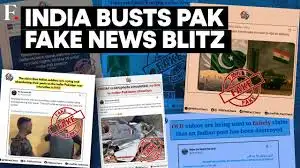Pakistan Air Force Propaganda Exposed: India Busts False Amritsar Airstrike Claim
In a recent wave of misinformation, social media platforms erupted with claims that the Pakistan Air Force (PAF) had successfully bombed an Indian military base in Amritsar, Punjab. A dramatic video showing a massive blaze accompanied these claims, portraying the PAF as the “undisputed king” of the skies.

However, Indian authorities quickly responded, dismantling the narrative and revealing that the entire claim relied on a manipulated video with no connection to any real event in India.
The Viral Video: Not From Amritsar
Several online accounts widely shared the footage, alleging it captured a Pakistani airstrike on Indian soil. The video, showing a large fire raging through what was claimed to be a military facility, triggered alarm among viewers.
India’s Press Information Bureau (PIB) Fact Check team investigated the source and proved that the visuals had nothing to do with India. Their analysis confirmed that the video actually came from a 2004 wildfire in California, United States. The terrain, vegetation, and even emergency response vehicles clearly pointed to a completely different continent.
This clip, repackaged to resemble an attack in Punjab, served as the centerpiece of a disinformation campaign.
No Airspace Violation Reported
Officials from India’s defense establishment dismissed the claims as false. The Indian Air Force did not detect any unusual activity in the region. No airspace violation occurred, and no military installations in Amritsar or nearby areas reported damage.
If Pakistan had actually launched such an attack, India would have responded with both strategic actions and public communication. The lack of any such activity underscored the baseless nature of the claims.
Disinformation in the Digital Age
This incident highlighted how information warfare has become a key tactic in modern-day conflict. Social media has created a fast-moving environment where fabricated content spreads within minutes, often before authorities can intervene.
In this case, the campaign attempted to undermine India’s military image while falsely glorifying Pakistan’s capabilities. While the claims failed under scrutiny, their rapid spread demonstrated how propaganda can distort reality if left unchallenged.
These tactics are not new. After the 2019 Balakot airstrikes and the Pulwama terror attack, both India and Pakistan experienced a surge in online misinformation, fake images, and exaggerated narratives.
India’s Swift and Clear Response
Rather than engage in emotional rebuttals, Indian authorities responded with facts. The PIB Fact Check team released verified visuals and evidence to disprove the video’s authenticity. Their calm, factual approach reassured the public and helped contain the spread of misinformation.
This professional handling stood in contrast to the sensationalism of the false claim. India’s transparent and fact-based communication won praise for diffusing a potentially volatile situation.
Experts Criticize the Failed Campaign
Defense analysts and military veterans also weighed in, criticizing the attempt to mislead people using outdated footage. “You can’t fake military success using wildfire videos and expect anyone serious to believe it,” said Air Marshal (Retd.) Anil Chopra.
Other experts emphasized that while the story failed to convince informed audiences, such campaigns still carry risks. “Disinformation can create confusion and increase tensions, even if no one acts on it immediately,” said a New Delhi-based strategic affairs analyst.
They urged countries to build better digital literacy and rely on fact-checking to counter the effects of false narratives.
What This Means Going Forward
This episode serves as a wake-up call. Today’s conflicts don’t just play out on battlefields — they unfold online. Countries not only need strong military defenses but also effective systems to fight misinformation.
India’s response showed that truth and transparency remain the best weapons against propaganda. At the same time, citizens must stay alert. It’s essential to verify news, question suspicious content, and rely on trusted sources.
When people take the time to fact-check before reacting, they help build national resilience against manipulation.
Final Takeaway
The false story about a Pakistan Air Force strike on Amritsar turned out to be nothing more than a misleading narrative based on an unrelated American wildfire. India’s quick, evidence-backed response exposed the campaign and restored public trust.
As nations continue to navigate the complexities of digital-age rivalries, episodes like this remind us of the urgent need for responsible online behavior and reliable information. The fight against Pakistan Air Force propaganda and similar misinformation won’t stop — but with vigilance and truth, it can be won.






